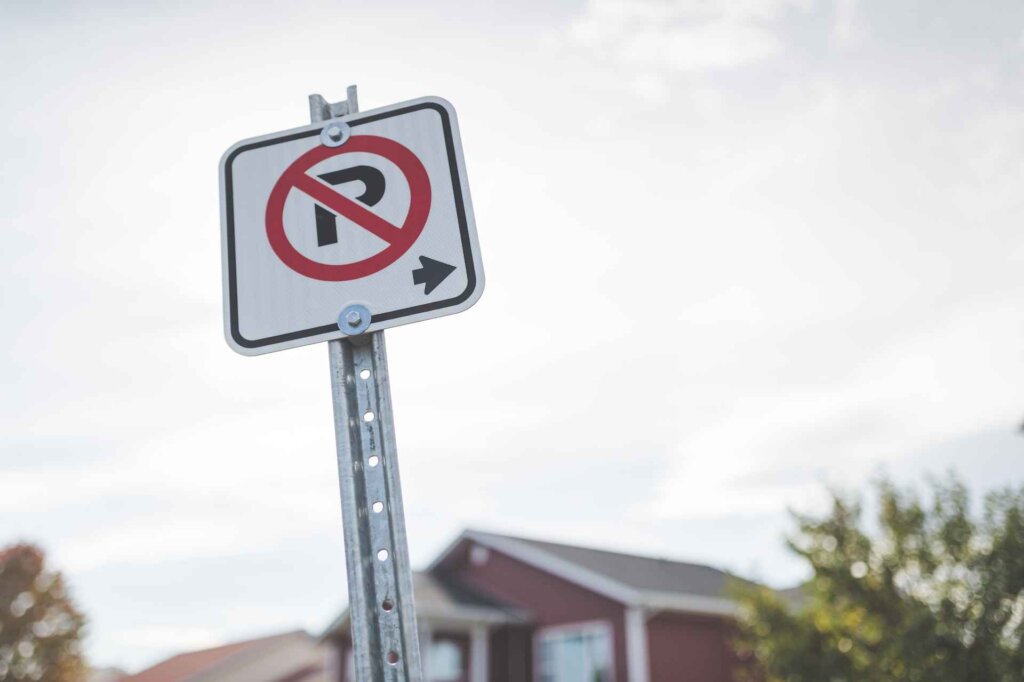Typically when this happens, it’s a temporary situation, and the RV is gone within 24 hours. But occasionally these situations will occur, and the RV remains parked seemingly indefinitely. Frankly, an unknown RV being parked in front of your house is unnerving, inconvenient, and most likely, illegal.
In this article I’m going to outline some of the most common RV parking laws in the United States, the do’s and don’ts of approaching an unfamiliar RV owner, and what can be done to get rid of a camper that is illegally parked on your street.
Common RV Parking Rules
The following parking restrictions and guidelines are common in many cities and metropolitan areas around the United States.
- RV parking is allowed for up to 72 hours before the camper must be moved.
- In cities where RV parking on public roads is illegal, permits can be obtained for temporary parking.
- RVs parked on public streets must be 30 feet away from traffic signs and fire hydrants and must not block or protrude into a sidewalk.
- Extra-wide RVs may not be allowed to park on a public street
- While overnight parking may be allowed via a permit, overnight camping is sometimes prohibited by local laws and ordinances.
- Camper vans that are registered as RVs are allowed unpermitted street parking as long as they are not being actively lived in.

Please remember, the rules listed above are simply laws that are commonly in place in American cities. Your city, state, and region probably have different and unique laws in regard to parking RVs on public roads. For accurate information on RV parking in your area, check the RV parking laws and ordinances in your city. Your state’s Department of Transportation website likely has information on state RV parking laws.
How to Approach an Unfamiliar RV Owner
So, it’s been a couple of days and nights since the strange RV parked in front of your house and you are ready for it to move on. You are a reasonable person and have been lenient for a couple of days, but at this point, you are ready for the street parking in front of your house to be clear and to not have a large RV obscuring your view of the neighborhood.
If you are like most people in the States, you would probably rather deal with a situation on your own before getting local authorities involved. This is an honorable route to take but is not without risks. Keep the following tips in mind when attempting contact and communication with an unfamiliar RV owner.
- Try not to knock on the door of the RV if possible. Knocking on the door can feel like an invasion of privacy and may put the RV owner on edge. Instead, wait for a moment when they have exited the vehicle and then initiate conversation.
- Be friendly. A smile and wave go a long way when talking to strangers.
- Do not use accusatory language when discussing their RV. Even if they are breaking local laws, just ask them how long they plan to stay and make it obvious you are hoping they move along soon. Accusatory language and tones can often make a person defensive and unreasonable.
- If conversation goes poorly, disengage from conversation quickly, calmly, and politely. Do not threaten anyone or elevate a heightened conversation.
- If a person is clearly living in an RV on your street, it is safest to not approach them directly about it. Report their information and location to local authorities on a non-emergency phone line.
- Never approach a stranger in the dark or at night.

Most importantly, if you feel even slightly uncomfortable or unsafe about an RV parked in your neighborhood, do not attempt contact with the owner. Instead, simply report it to local authorities and let the police get in contact with the owner. Follow up with the police at a later date and they may be able to inform you of how the situation is being handled and when you can expect the RV to move.
Reporting an Illegally Parked RV
Here are the steps to follow if there is an RV illegally parked in your neighborhood or in front of your house.
- Write down the license plate number of the RV and some defining details such as color, style, brand, and any unique distinguishing features such as bumper stickers or curtain patterns.
- Call local authorities on a non-emergency line. A non-emergency number is a phone number that can be used to contact authorities such as police or city code enforcement without taking up the valuable time and resources of 911 emergency services.
- Wait for the police to get in contact with the RV owner.
Beyond these steps, there is not a whole lot that an average civilian can safely and legally do. Disputes over parking laws should only be dealt with by law enforcement officers and government agencies.
Unfortunately, if there is an RV on the street that is not violating any law or ordinances, there is nothing that can be done to remove it. Even if the rig is an eye-sore and is taking up some prime street parking, if the owner is following the letter of the law, they are within their legal right to park there. Sorry ’bout it.
Where Can RVs be Parked Legally?
OK, so it’s pretty clear at this point that in most cities, parking an RV on a residential street is not a feasible long-term storage solution. Here are some places you may be able to park your rig for storage.
- On your lawn. Cities that do not allow RV owners to park their camper on residential streets often allow homeowners to store a rig on their lawns. There are specific rules imposed on RVs parked on a lawn, so if you plan to do this, educate yourself on local ordinances.

- In RV and boat storage facilities. Many cities and towns across America have at least one storage facility that caters to folks needing large storage units. These facilities are secure and usually offer covered parking areas to protect your camper or boat from rain and snow.
- In your driveway. As long as it is not protruding into the sidewalk, most cities allow you to park a camper in your driveway indefinitely.
- In RV parks. You can pay to camp and live in your RV in an RV park or campground. It is illegal to park in an RV park or campground without paying for the right to do so.
Frequently Asked Questions
See what our readers want to know about parking their camper!
Can I park my RV in front of my house?
Yes, you can typically park an RV in front of your house for up to 72 hours without a permit. Local ordinances may dictate that you need a permit to park an RV on residential streets.
Is it legal to live in an RV on my property?
There is no black-and-white answer to this question. In some states you can live in an RV on private property, in others, you cannot. This is a question for your local zoning authority.
How do I report an abandoned RV in my neighborhood?
Local authorities can be reached via a non-emergency phone number. They will gladly take note of the location of the RV and dispatch someone to investigate.

Final Thoughts
I think it’s a good practice to generally be wary of strangers, but please don’t assume that every RV that pulls into your neighborhood is up to no good. More than likely, it is simply a guest visiting one of your neighbors while on a road trip through your state or region. If you do need to talk to someone about how an RV is parked in your neighborhood, try not to be rude about it. Do your best to approach with compassion and understanding, as they may just be ignorant to local laws.
With a tricky housing market, a shaky economy, and a steady increase in folks interested in minimalism and van life, we are about to be seeing a lot more RVs in our wild spaces, on public streets, and in our neighborhoods. It may take a while to get used to, but it’s not necessarily a bad thing.
As local laws and ordinances play catch up with adjusting to housing trends, it’s going to be up to us to show each other compassion, neighborly love, and understanding. We’re all in this together, right?
So, the next time an unfamiliar rig rolls down your street, try not to see them as a potential threat, and instead look at them as a potential new friend.
Cheers!



